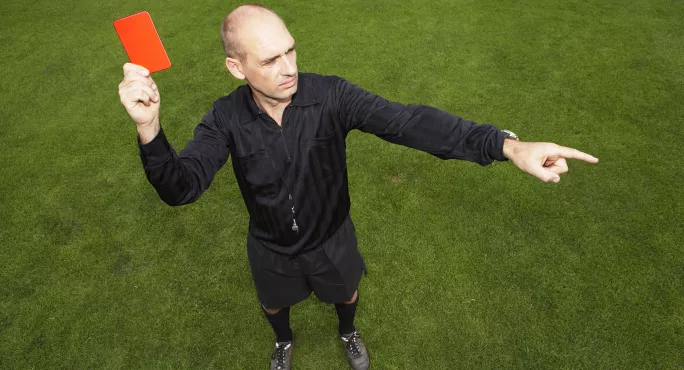Ofsted’s inclusion focus won’t penalise suspensions, says chief

Ofsted’s focus on inclusion will not “penalise” schools that use suspensions and exclusions “legitimately”, the watchdog’s chief said today.
Addressing multi-academy trust CEOs this morning, chief inspector Sir Martyn Oliver said that “schools must meet the needs of all their local children”.
He was speaking after Ofsted announced that inclusion will be one of several new criteria in the upcoming school inspection report card, which the government confirmed will replace single-word grades from next September.
When it comes to judging inclusion, Sir Martyn said schools will be marked on whether their “behaviour policies and practices are appropriate” and whether they have high-quality alternative provision, where relevant.
In his speech to the Confederation of School Trusts’ (CST) conference in Birmingham, Sir Martyn also said that the inspectorate must move “as far away as possible from uncovering and detecting failures only”.
Ofsted introducing report cards
He talked about Ofsted’s role in the consultation on the new report card system and inspection framework. A public consultation is due to begin in January.
“The standards should not be ones dreamt up by Ofsted but be inherent in the professional standards, regulations and statutory guidance,” Sir Martyn said.
When asked by Tes in a press briefing whether Ofsted was leading in the report card consultation, he said that Ofsted’s framework, including where that relates to the report card, is the “model that we’re developing”. However, he said that the report card and its “total depth or brevity” is a matter for the education secretary.
- Inclusion: Bridget Phillipson unveils plans for SEND inclusion in schools
- Report cards: Scorecard trial to assess how well schools serve disadvantaged pupils
- Ofsted changes: Reforms ‘risk blaming schools for wider SEND crisis’
Headteachers had warned that the consultation on the next school inspection framework and the new report card system should not be left to Ofsted to lead and design “behind closed doors”.
Sir Martyn said the new framework will have a “greater focus on pupil outcomes” but will continue to emphasise the importance of curriculum.
“I am not changing for change’s sake, and much of what we do now - and we heard you like - such as the focus on the curriculum, will endure,” he said.
Sir Martyn also confirmed that Ofsted is not directly involved in the new Regional Improvement for Standards and Excellence (RISE) teams that the government announced this week. Ofsted report cards are set to play a key role in this new regional approach to school improvement.
“How the DfE chooses to use our information or not, for the RISE teams, that’s a matter for them,” Sir Martyn said. However, he added that he imagines Ofsted would be a “very significant part” of the RISE teams.
He also confirmed that Ofsted will be putting forward plans for a “new standalone assessment of safeguarding” in its reports.
Labour, in its election manifesto, promised to introduce annual safeguarding checks as part of its reform of the inspection system.
Sir Martyn also addressed concerns about the way that MAT leaders conduct themselves during inspections. “We’ve certainly heard instances of this more recently,” he said when taking questions afterwards.
“I am hearing about occasions where trust leaders are putting pressure on inspectors and making the inspection process more adversarial,” Sir Martyn said in his speech.
However, he added that he is “acutely aware of the vast amount of pressure each sector is already under”.
‘Show courtesy to inspectors’
During questions, he stressed that he did not advocate an “adversarial” system. He did not want school leaders to see inspection as “a moment of threat in their organisation” - instead, it should be an opportunity to “check how well their organisations are working” and to provide them with an expert “external reference point”.
The Ofsted chief urged trust leader delegates to “behave with the same courtesy” as he expects from inspectors.
He expressed a desire to make inspection more “diagnostic”, rather than leaders waiting for Ofsted to “turn up and identify strengths and areas for development”.
Sir Martyn also stressed that inspection should not be an incentive to prevent certain children attending a school.
“What we don’t want to see is schools turning children away because of Ofsted, because they get this sense of ‘these might be difficult children and they can’t be educated here’, or ‘that might bring our school down’,” he said.
Sir Martyn’s speech came after education secretary Bridget Phillipson yesterday set out measures to make mainstream schools more inclusive, including introducing special educational needs and disabilities (SEND) advisers and a neurodiversity expert group.
CST’s annual conference will conclude today, after keynote speeches from chief executive Leora Cruddas and Becky Francis, chair of the review of curriculum and assessment.
For the latest education news and analysis delivered every weekday morning, sign up for the Tes Daily newsletter
Keep reading for just £1 per month
You've reached your limit of free articles this month. Subscribe for £1 per month for three months and get:
- Unlimited access to all Tes magazine content
- Exclusive subscriber-only stories
- Award-winning email newsletters
topics in this article



